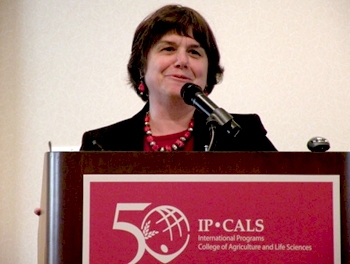Female farmers are growing in importance in global development
By John Bakum

"We talk about ending hunger in the world. If that's our goal then let's talk about who is providing food for families: women," said Catherine Bertini, World Food Prize laureate and professor of public administration and international affairs at Syracuse University, at a March 8 panel discussion, "The Feminization of Agriculture: Truths and Consequences."
Commemorating International Women's Day and moderated by Bertini, the panel featured three Cornell professors examining multiple consequences of the increasing role of women in agriculture in the developing world.
"Women have always worked in agriculture; they have just been invisible," said Shelley Feldman, international professor of development sociology and director of Feminist, Gender and Sexuality Studies. "Now that we are talking about the feminization of agriculture, we should talk less about the numbers of women working in agriculture and more about the kinds of agricultural work they are doing."
Pilar Parra, research associate and senior lecturer of nutritional sciences, considered factors leading to more women being heads of household farms. "In Africa, male mortality due to AIDS and the migration of men into the cities looking for industrial jobs are some of the factors that have left women behind at home, responsible for farming to feed and support their family in addition to their traditional domestic work. It's important to remember that context always matters."
Working in Zambia, Alexander Travis, associate professor of reproductive biology and wildlife conservation and a fellow at Cornell's Atkinson Center for a Sustainable Future, is an eyewitness to changing gender roles in agriculture. "It's imperative that agricultural development work be aware of how the increasing number of female farmers affects everything from crop selection to how things are sold at markets," he said.
Bertini announced two new grants totaling almost $40,000 from her foundation, The Catherine Bertini Trust Fund for Girls Education, to help construct a girl's dormitory in Kitenga, Tanzania, and to fund three educational projects for girls and women in Ghazni, Afghanistan.
A poster session followed the panel discussion, highlighting multidisciplinary initiatives around campus that study gender issues in international agricultural development.
The event was sponsored by International Programs in the College of Agriculture and Life Sciences (IP-CALS) and AWARE (Advancing Women in Agriculture through Research and Education) as part of IP-CALS' 50th anniversary celebration. AWARE is an initiative to ensure that gender is considered in all IP-CALS activities. It espouses the greatest potential for significant impact in rural development by focusing on women in agriculture as an underserved group.
John Bakum is a communications specialist with International Programs.
Media Contact
Get Cornell news delivered right to your inbox.
Subscribe